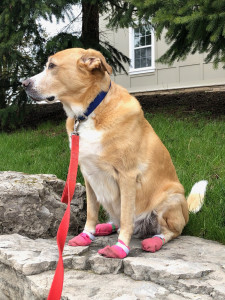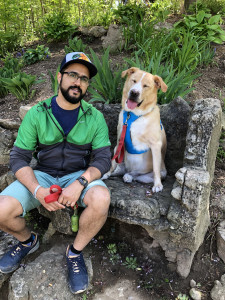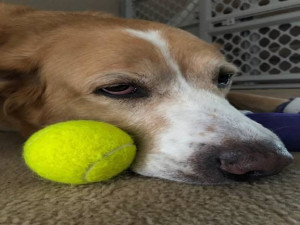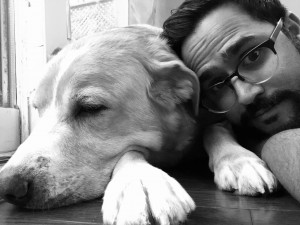A Lesson in Resilience
—by Daniel Gonsalves
Hello everyone,
I wish to start off by saying that I hope you and your families are doing well, that you are managing through these trying times as best as you can, and that you are taking care of yourself. I also want to thank you for your role in planking Canada’s curve—as it is said, “We’re all in this together”.
Say hello to Charlee!
 I want to introduce you to someone. This is Charlee. Please notice the two e’s, it is apparently very important to him.
I want to introduce you to someone. This is Charlee. Please notice the two e’s, it is apparently very important to him.
Charlee is a nine year old Collie-Retriever mix. He loves swimming, playing fetch, and finding objects you hide for him. He adores food and is, unfortunately, allergic to grass and pollen. This presents quite a challenge.
But, like many challenges in life, Charlee’s allergies are beyond our control. We were forced to deal with the situation, and adapt.
So, Charlee lives his life, as happily as ever: eating food, swimming, cuddling, and wearing… booties. Chances are, if you’ve heard of a dog with bright pink boots walking around Burlington, it’s Charlee!
This pandemic was also out of our control and, like Charlee’s allergies, presents new difficulties. And so new adjustments to be made.
These days I’ve been thinking more and more about Charlee, and how he teaches us an important lesson on resilience. Animals and nature in general can teach us a lot about this subject.
Lesson 1: What is in versus what is out of your control
Charlee’s genetic lottery included feet for swimming and a pretty decent nose for finding things, like old treats that fell under the couch, but it also included his allergies.
While Charlee would love to spend time running bare-pawed through meadows, he can’t. However, he can wear his boots to protect his feet. He will tell you that it’s not quite the same, and grumble when you put them on him, but that’s okay—we’ve adapted.
There has been a lot of stress, loss and terrible circumstances as a result of this pandemic – something that we had no control over. But we’ve also seen the incredibly wonderful ways in which people leverage the things that they do have control over. From picking up groceries for folks who can’t, to learning how to host a ‘virtual’ Passover celebration using Zoom.
We may not have control over many things these days, but like Charlee, we can adapt and excel at what we do have control over.
Lesson 2: Excitement and Positivity
 Every morning I wake up to an 88 lb ball of fur, wagging his tail, bouncing around the bed while smiling. Yes… I know my dog is mainly thinking about me getting him his breakfast.
Every morning I wake up to an 88 lb ball of fur, wagging his tail, bouncing around the bed while smiling. Yes… I know my dog is mainly thinking about me getting him his breakfast.
- Can you imagine being that excited for breakfast… Every day? For nine years?
- Can you imagine waking up everyday, with that level of positivity about… Anything!
Charlee is excited for breakfast, because he is hungry. But after breakfast, he is excited about doing his ‘happy dance’, then he is excited about going outside, and then he is excited about coming back inside where he gets a special treat-dispensing ball to roll around.
And after that, it doesn’t matter what we are doing… Charlee is up for it.
Me: Want to go in the car, without knowing anything about where we are going?
Charlee: Yup!
Me: Want to just sit next to me on this conference call?
Charlee: Oh, do I ever!
Yes, it is hard these days but if we can find something to be excited and positive about, right from the time we wake up, we set our day up for success. If we can find excitement in the simple, mundane things, it will make it easier to be positive about trying new and different things.
We may not be able to keep up Charlee’s nine year streak of positive mornings, but we can try.
Lesson 3: The three R’s (no, not “Ruff, Ruff, Ruff”)
Dogs love routine. It gives them a sense of comfort and familiarity. However, it does not mean they do not love to be surprised; it just means that when something is out of routine, they notice.
Charlee notices that my partner and I are home all day, every day. He has noticed the stoppage of the weekly visit from my in-laws and the ‘every other day’ visit from his dog walker. Every person that he knows outside of our household and every activity he did without us has vanished from him.
And yes, has he ever noticed. Charlee expresses it with a bit more attitude and jumpiness. He has been licking his paws more and exhibiting other symptoms of anxiety. This is not unique to him either; our vet has described how many pets are exhibiting behaviours like this recently.
The solution? Well, there isn’t one. Or at least there isn’t one, single solution. Or one that will work all the time. But there are things to shoot for everyday.
Charlee’s told us that he needs these three things.
Routine, Rest and Relaxation
 Charlee needs routine. Can you imagine if, in addition to the upheaval in Charlee’s social life, we also completely threw his routine away? If I didn’t give him his breakfast first thing in the morning? If we didn’t go for a morning and evening walk? Charlee also needs quiet time. For himself. By himself.
Charlee needs routine. Can you imagine if, in addition to the upheaval in Charlee’s social life, we also completely threw his routine away? If I didn’t give him his breakfast first thing in the morning? If we didn’t go for a morning and evening walk? Charlee also needs quiet time. For himself. By himself.
We don’t have a huge household; just Charlee, my partner, and I. But we used to have our own daily time alone. We would commute to work… He would rest at home alone. Small naps throughout the day to ensure he is well rested.
And Charlee needs time to relax. For him, it could be chewing a tennis ball or just sitting on the landing by the door, waiting to bark at anyone not respecting physical distancing in front of our house. This is his downtime. It is what relaxes him.
If we were look at our lives next:
- We also need some routine, now that we’ve lost so much of it. Putting on ‘day clothing’, eating together, weekly calls to friends or family, and more. If we can still do old routines, do them. And if you need to find new ones, please do so. It helps to give us a sense of familiarity and comfort.
- Give yourself some rest. Whether you are responsible for taking care of yourself or others, you need to rest. This is a physically and mentally draining time and we need to recover. Charlee rests every chance he gets not only because its part of his routine but also so that he has the energy to do the things he loves, or to respond to something unexpected: like a squirrel in the backyard. Rest today, so you can tackle tomorrow.
- Find something relaxing to do. For YOU. It doesn’t have to be by yourself. But it should be something you enjoy. Maybe its a new hobby or physical activity. Maybe its reading a book or watching a movie. Whatever it is, allow yourself the time to do it, where possible. You deserve this time, you owe it to yourself.
So, what is it that we can learn from Charlee in this moment?
 Resilience. His ability to recover from difficulties. The behaviours that allow him to persevere.
Resilience. His ability to recover from difficulties. The behaviours that allow him to persevere.
Animals and nature have no choice but to do so. It isn’t easy, and some days will be better than others. What’s important is that you do the best that you can, given the situation, and adapt.
We as a Y, as Canadians, as a global people will also recover.
I have been a part of the YMCA of Oakville for over 17 years, and I have complete confidence in us as an organization, and our ability to work through difficulties. From our senior leaders to our front-line staff, I know that we have the people, the skills, the passion and the resilience to see this through.
Every one of you will have stories of the ways in which you adapted, techniques that you employed, obstacles you overcame and difficulties you recovered from and—like the lessons I’ve learned from Charlee during this time—I very much look forward to the work we will do together someday soon, what we will learn from one another, and to seeing all the ways in which we’ll grow stronger as a whole.
About the author: Daniel Gonsalves is Manager, Human Resources & Compliance at the YMCA of Oakville. This note is part of the Staying Connected series.
